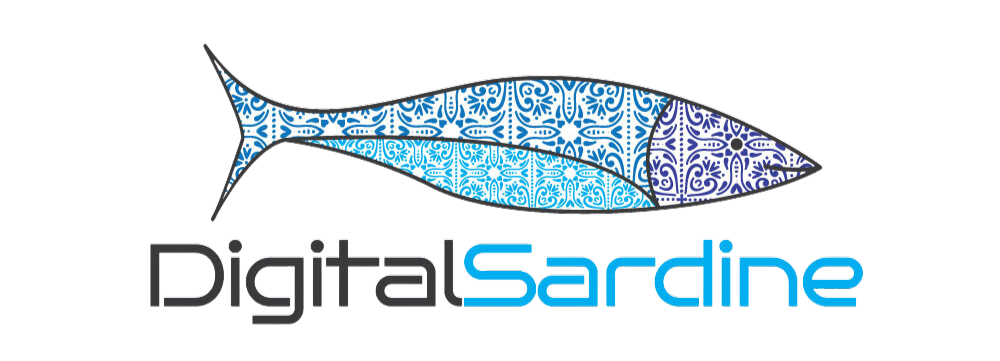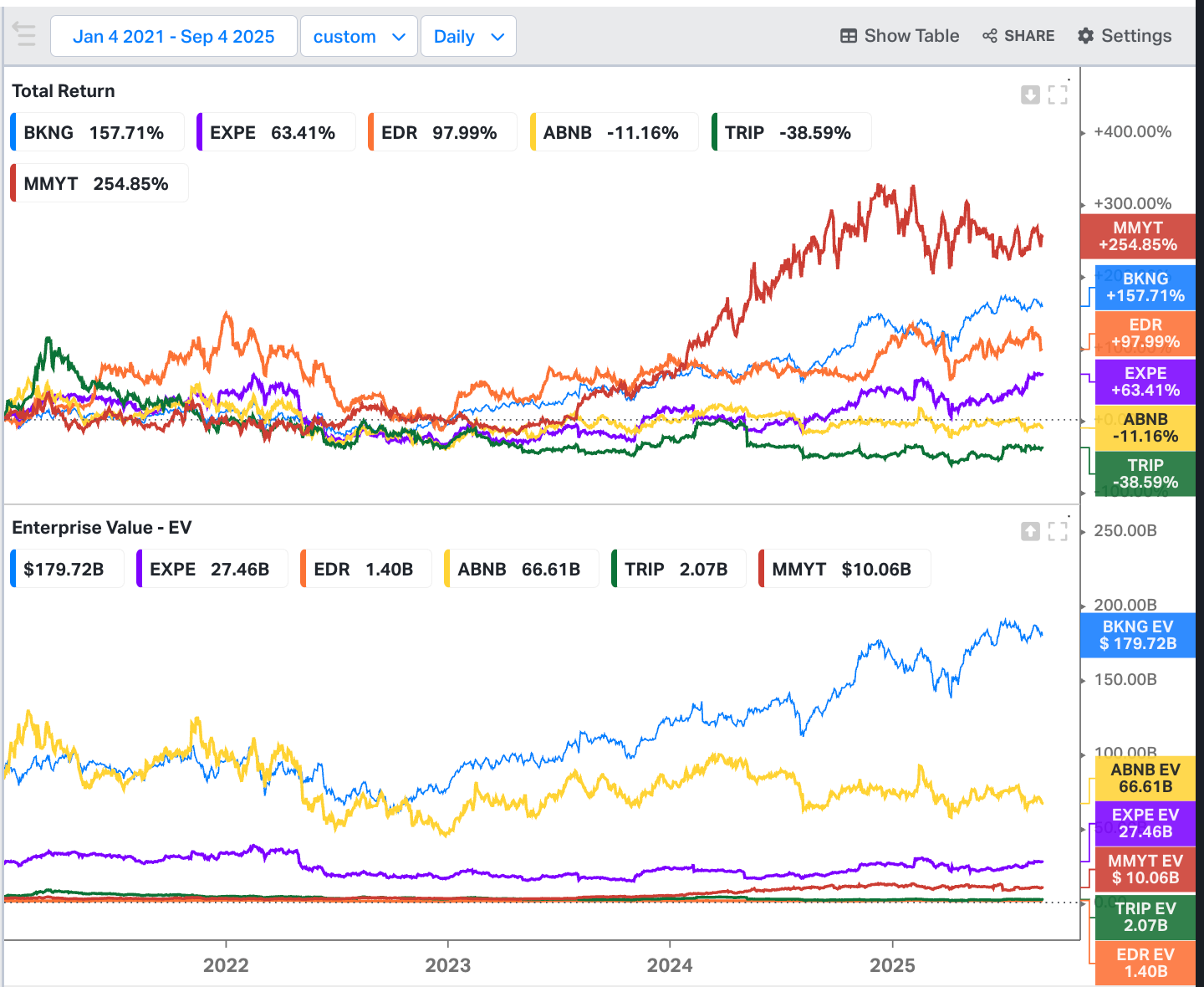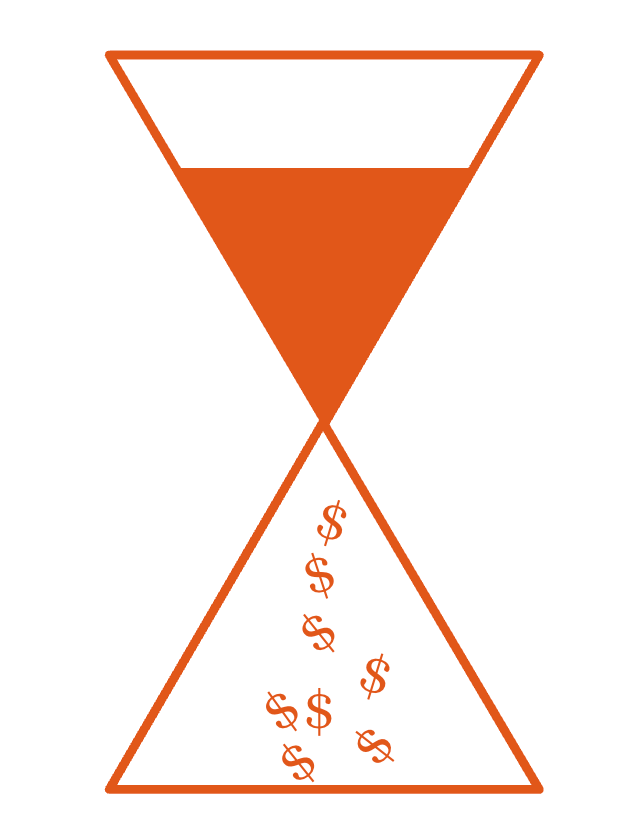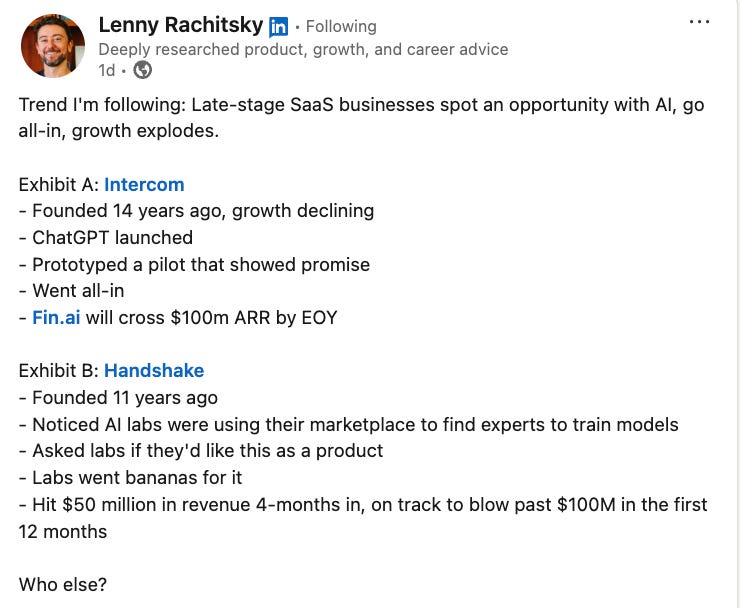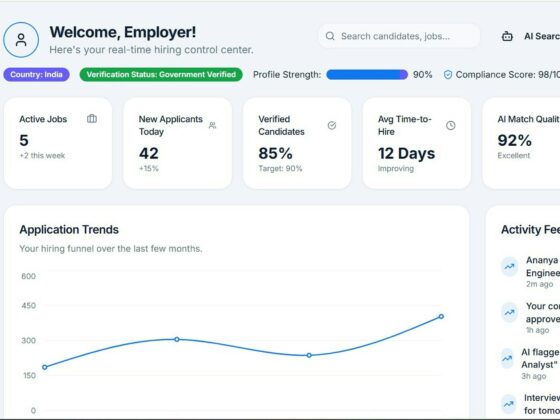Travel is full of barriers. Markets concentrate when investors reward scale. Language still keeps many travelers from going local. And even inside our products, A/B tests and AI outputs can create invisible walls. This issue looks at where barriers still hold us back and where they’re starting to fall.
Special thanks to Digital Sardine for sponsoring this edition of the newsletter:
Ever feel like your Google Ads should be working harder? As you prepare for 2026, Digital Sardine—a boutique travel PPC consultancy—is offering a free audit. Get expert eyes on your campaigns, uncover what works (and what doesn’t), and build a stronger foundation backed by $500M+ in managed ad spend.
1. Boring wins
Since January 2021, Booking has seen a 158% increase and is now valued at almost $180 billion in enterprise value. MakeMyTrip has been the breakout, up 255% as India’s market surged. eDreams has nearly doubled, Expedia is up 63%, while Tripadvisor has slid 39%. Airbnb is the outlier: still worth $67B, but its stock is down 11%. Investors are rewarding focus and predictable margins. Booking keeps selling hotels and flights at scale, MakeMyTrip has locked in on India, and both have been rewarded. Airbnb’s lifestyle pivots haven’t convinced Wall Street. TripAdvisor and eDreams trade at a fraction of the scale, reminding us how concentrated global travel has become.
2. The $198 billion blind spot
Travelier CEO Noam Toister pointed out something many already knew but few are willing to say: some industry reports reflect who sponsors them more than the actual state of travel. He mentions that Skift’s latest 279-page “State of Travel” report covers flights, hotels, car rentals, and cruises, but not ground and sea transportation, a $198 billion sector that is larger than cruises, car rentals, or home rentals. Two years ago, Travelier even paid Skift to research this space, which resulted in a detailed report. Without the sponsorship, the sector vanished. This is surprising given the scale and momentum of players like Flix, BlaBlaCar, Omio, Trainline, Travelier and many others that are actively shaping the connected trip. Read Noam’s full post here.
I asked a few AI models if a “State of Travel” report should cover ground and sea transportation. Claude, OpenAI, Perplexity, Gemini, and Grok all answered some version of “yes, of course.” Perplexity even cited Skift as a source.
3. The real unlock is translation
If some markets are underreported, others are just underappreciated. When we talk about the next big revolution in travel, the focus usually goes to futuristic AGI. Kwon Ping Ho, founder of Banyan Group, argues that the most critical shift in travel tech right now is real-time translation. He compares it to the arrival of low-cost airlines. Once a barrier drops, whole markets open. Translation removes the friction of language, letting travelers connect directly with locals, stay in smaller guesthouses, and explore without feeling cut off. Airbnb’s Brian Chesky adds that AI hasn’t reinvented platforms yet, but in customer service and translation, it’s already changing how people travel. Read +
4. Propellic’s new research…webinar coming up
Propellic will present new findings on how travelers use Google’s AI Mode to plan and book. They’ll go deeper into the results and what players should do about it in their upcoming webinar. Some highlights:
-
56% of travelers went straight to hotels or tour operators, while OTAs barely reached 6%.
-
Google Business Profiles act like storefronts, drawing more clicks than anything else as travelers checked reviews, prices, and photos before moving on.
-
Planning time in AI averaged 104 seconds, nearly 3x the 38 seconds spent on booking outside of AI.
-
AI responses scored high on trust, averaging 4.3 out of 5.
Register for the webinar here (hurry because registration is limited to 500)
5. The value of a minute
Scott Belsky makes a smart point about AI and time. As technology makes every minute more productive, the value of each minute rises. Instead of freeing us, it may push us to spend our time more intentionally, on things AI cannot replicate. That means we’ll crave more human-crafted travel experiences, the kind that feel scarce and personal. He also raises the question of brand in the AI era. Will we care less about brand if agents make decisions for us, or more, because brand becomes the signal of meaning when everything looks commoditized? Read + The Great Unlock of Your Time
6. The moat is in the evals
In AI, ‘evals’ are tests that check if a model is doing what you expect. The equivalent of QA, usability tests, or A/B tests for AI. They’re becoming essential because outputs are probabilistic, not deterministic.
Smart folks agree they’re a big deal: Lenny Rachitsky (writer/investor, ex-Airbnb PM) calls evals the SQL of the AI era. Garry Tan (YC President) says they’re the real moat for AI startups. Sarah Guo (VC, founder at Conviction, formerly general partner at Greylock Partners) calls them the new marketing. More about evals here.
If AI is going to handle workflows from support to itinerary design, we need ways to check if it actually works. In travel, that could mean testing whether an AI reliably suggests safe, bookable routes or hotels that match a traveler’s filters. The skill of designing and running evals will matter as much as building the models themselves. It’s what separates a flashy demo from a product that can scale.
Brendan Foody, founder and CEO of Mercor.ai (an AI-powered hiring platform launched in 2023 and already valued at $2 billion) puts it this way:
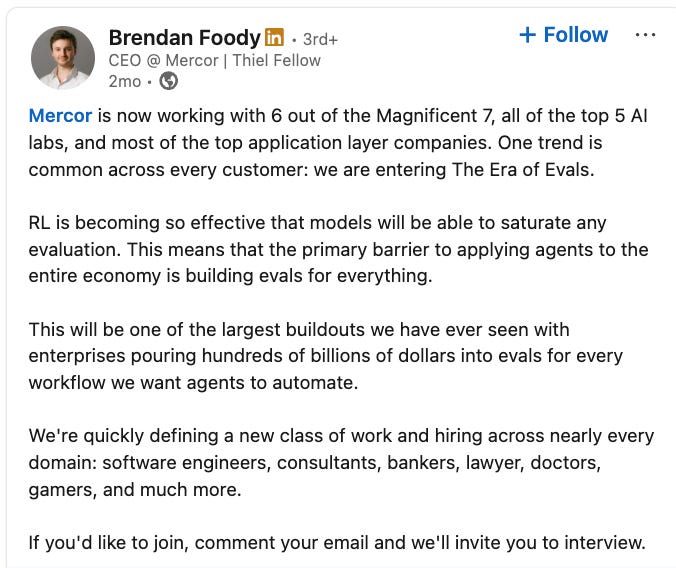
7. The end of fixed-itinerary tours?
Alex Bainbridge (founder and CEO of Autoura) put out a short paper arguing that the fixed itinerary tour is on its way out. He offers 15 ways AI could reshape sightseeing, from tours that adapt in real time to destinations actively managing visitor flow. Human guides would take on more of a coordinating role, stepping in to add local knowledge or keep things on track, while feedback would happen live instead of through reviews. Itinerary design would shift from suppliers to travellers working with their AI. He also predicts the economics of sightseeing will change, with micro-transactions replacing fixed tour tickets. Read + Alex Bainbridge
8. AI as a growth reset
If AI is reshaping tours, it’s also reshaping business models. Lenny Rachitsky points out a new pattern: late-stage SaaS companies are reigniting growth by going all-in on AI. Startups may be early adopters of AI, but mature companies are showing that it can serve as a second act. The next curve often comes from embedding AI into areas where growth has slowed.
In travel, Expedia is starting to show what that looks like. Scout drove $6B in incremental partner revenue, AI filters convert 1.3x better, and flight price prediction lifts conversion by 15 percent. These are meaningful results at scale, but they look more like optimization than a reset. I’d love to hear what else you see.
9. AI as a scale equalizer
For startups, the angle is different. This Harvard Business Review report makes the point that entrepreneurs who aim to grow quickly are the ones leaning hardest into AI. For lean teams, it’s a way to punch above their weight… automating grunt work, testing markets faster, and scaling without adding headcount they can’t afford. For lean teams, AI is less about resets and more about reaching scale earlier than would’ve been possible.
10. With enough A/B testing, every website becomes a porn site
At the other end of the spectrum, it’s worth remembering what not to optimize. A/B testing tells you which button gets more clicks, but it can’t tell you what’s worth building. Endless optimization promotes hidden fees and turns hidden gems into overcrowded stops. At some point, you have to take a stand. That’s how you build products people love instead of ones that only convert.
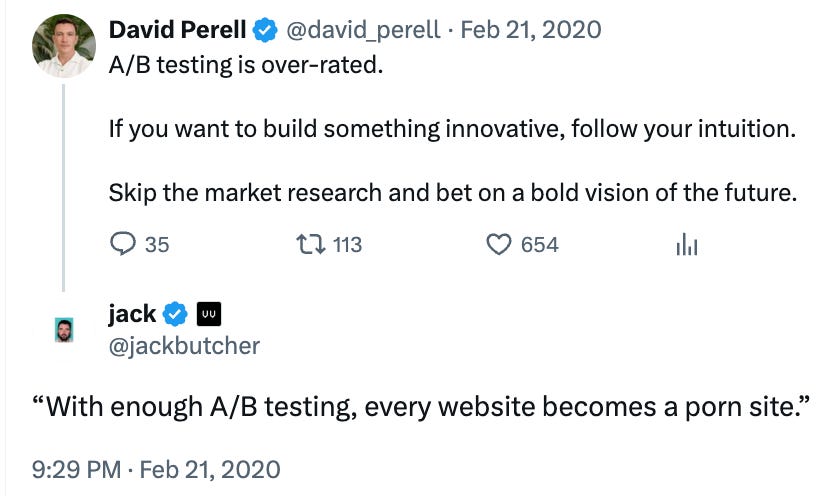
Travel Tech Essentialist Job Board
→ Explore all 1,358 open roles on the Travel Tech Essentialist Job Board now.
-
Airbnb | Strategic Business Operations Lead, WW Community Support | USA ; Remote | $200k-$250k + Equity
-
Airalo | Senior Director, Brand | UK; Remote
-
TravelPerk | Senior Manager, Global Hotel Partnerships | Miami; Boston; Chicago
📩 For monthly updates on the latest roles, subscribe to the Travel Tech Jobs newsletter
Raising a round?
If you are a startup looking to raise a round (from pre-seed to Series D), I can help (for free). Travel Investor Network is a private platform where I recommend innovative travel startups to investors and innovators. If you’re interested, please start by completing this form.
If you like Travel Tech Essentialist, please consider sharing it with your friends or colleagues. If you’re not yet subscribed, join us here:
And, as always, thanks for trusting me with your inbox.
Mauricio Prieto
